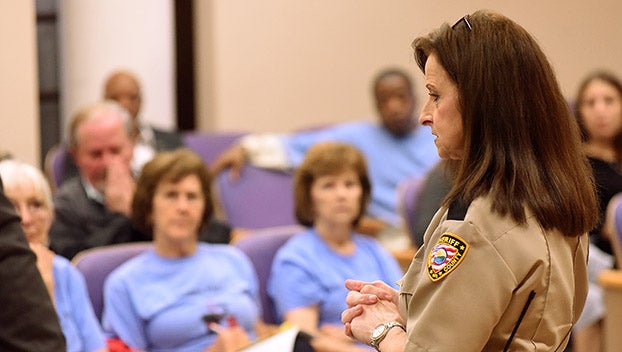Officials: Strong community push key to changing animal protection laws
Published 11:58 pm Monday, November 13, 2017
NATCHEZ — Changing the dogfighting and animal cruelty laws in Mississippi will require a forceful, statewide push for legislative action, officials said Monday morning.
The discovery last week of a suspected dogfighting farm in Adams County prompted the meeting of approximately 20 city and state representatives.
Mayor Darryl Grennell called the meeting after Tommie McQueen, the owner of the property where 56 dogs were found, was released on a bond of $60,000.
The meeting included the mayors of Natchez and Ferriday, representatives of the Adams County Sheriff’s Office, the Natchez Police Department and the Adams County Board of Supervisors as well leaders from local humane societies and local judges.
Julia Breaux Melancon, Louisiana state director and Mississippi legislative director for the Humane Society of the United States, said the laws surrounding animal cruelty in Mississippi are incredibly lax.
A misdemeanor animal cruelty charge in Mississippi can mean up to six months in prison and a maximum $1,000 fine. Mississippi law has no felony-level animal cruelty charge.
Breaux Melancon said the laws surrounding dogfighting, too, should be stronger.
Under Mississippi dogfighting laws a convicted person can be held no more than three years in the state penitentiary and face fines of no more than $5,000.
Louisiana law tops out dogfighting fines at $25,000, Breaux Melancon said.
The lack of stronger legislation surrounding animal cruelty and dogfighting is problematic not just because it allows criminals who subject animals to inhumane situations to walk free after a mere year in county jail, but because dogfighters in neighboring states could be drawn to Mississippi in order to face lower penalties.
Breaux Melancon said prior to Louisiana updating its animal cruelty law in 2010, she saw several cases wherein a dogfighter from Texas would travel to Louisiana so that, in the event he or she was caught, they would face lesser penalties.
Breaux Melancon said she believes that could be the case in Mississippi, too.
“You’re going to get a flood of people to come in for dogfighting, and they’re going to do it here because the risk is a slap on the wrist,” she said. “This case is kind of a tipping point for you all in Mississippi. You can say, ‘We’ve woken up and this is a problem.’”
Grennell asked Breaux Melancon what steps he and other citizens should be taking to get actual change in the state.
“This is the start,” Breaux Melancon said. “Then get your legislators here. Until they see that their constituents, their voters, think this is a priority, this falls on deaf ears.”
Grennell said Monday’s meeting, which was closed to the public, was intended to gather thoughts and to form a plan to change Mississippi laws, but that he wants the Adams County community to become involved in the effort soon.
Grennell said he is in the process of organizing a second meeting, this one open to the public, in early December where he will “talk to our legislative delegation and demand that we have change.”
Sen. Bob Dearing, D-Natchez, attended the meeting Monday and warned about the difficulties in passing animals rights legislation.
Dearing said he has been a long-time activist for animal rights, but that actually passing laws on the matter is more difficult than it seems.
In 2011, Dearing successfully introduced a bill that would add cats to the standing animal cruelty law. Before that addition, Dearing said virtually no protection for cats existed in Mississippi. Adding that legislation, he said, became moored in a series of compromises just to get it through the House of Representatives.
“It took five years,” Dearing said. “The law we passed was not a strong law. In fact, it’s a weak law. But at the time, it was the best law we could get.”
This time around, Dearing said he wants to pass something stronger, and he said he thinks the case in Natchez could be the incentive to make it happen.
Instead of a maximum $5,000 fine, Dearing said he wants to push for a maximum $50,000 fine. Instead of a up to three years in a state penitentiary, he said he would like a law that set a minimum five-year sentence and a maximum of 10 years.
Sixth Circuit Court District Attorney Ronnie Harper said the plan has a single, but large problem.
“It’s the hardest thing in the world to get those people to do anything up there,” Harper said. “You better be prepared to go to the capital building or you won’t get to first base on this.”
Former Natchez Mayor Tony Byrne said the problem is not as simple as convincing senators and representatives of the severity of the issue — it is overcoming well-funded lobbying firms and political agendas, too.
Byrne worked with Dearing in 2011 to get cats added to the animal cruelty bill and said he understands how difficult passing this legislation can be.
Byrne said the biggest “enemy” of animal rights legislation is Farm Bureau, an insurance company that has dozens of lobbyists in Jackson.
“When you go up there, expect Farm Bureau to fight you tooth and nail,” Byrne said. “If you don’t think Farm Bureau is powerful, you’re wrong. If you don’t think they have enough money up there to kill anything with animal cruelty, you’re wrong. The enemy right now is Farm Bureau.”
Grennell said he wants Adams County to lead the charge in overcoming the bureaucracy surrounding animal rights in Mississippi.
Aside from coordinating with other cities who similarly would like to see a change in animal cruelty legislation, Grennell said he needs the public to come out and support animal rights as well.
“I want as many people as possible,” Grennell said. “Come out and show concern about what’s happening. When it’s time to go to the capitol, I hope they’re lobbying and protesting in support of changes to policy.”
It is important to keep in mind Breaux Melancon said, that the risk of setting animal abusers free extends beyond repeated abuse to a dogs or cats.
“People don’t understand the connection between animal violence and human violence,” she said.
Since January 2016, the Federal Bureau of Investigation has kept a registry of animal cruelty in America. The FBI’s statement on the registry suggests animal cruelty is considered a precursor to other, often larger crimes.
Breaux Melancon called animal violence a “canary in a coal mine,” an indicator that the person involved does not care about life, human or non-human.
Not treating these crimes seriously, she said, is dangerous.







